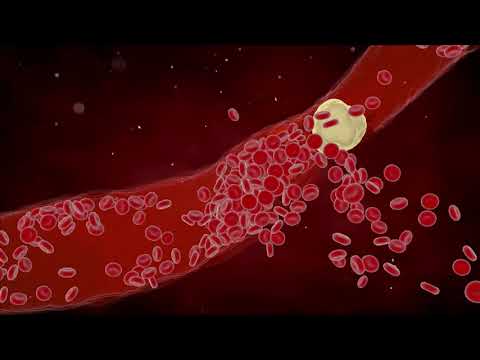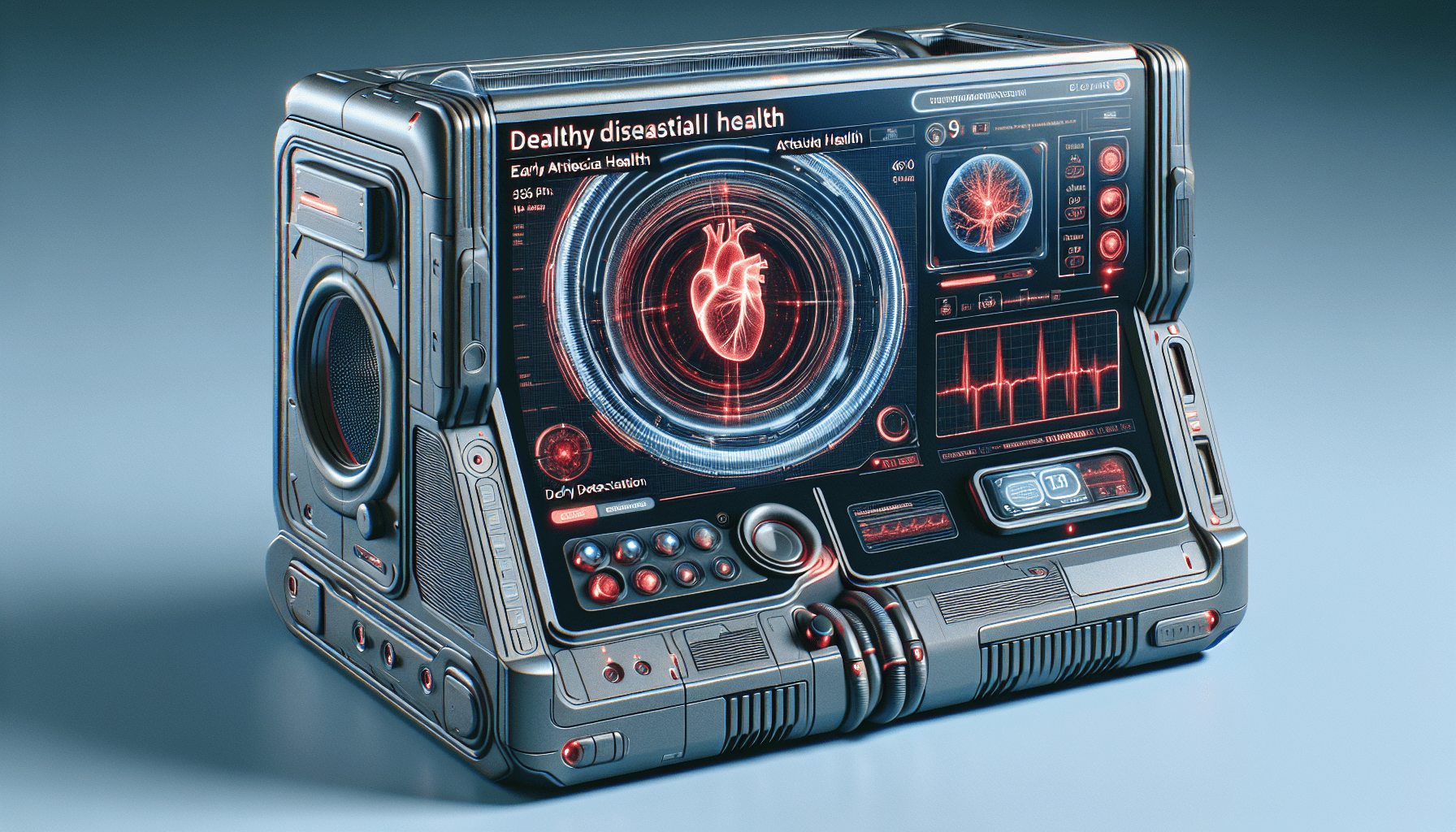Hello there! Dr. Eric Prince, a naturopath, is here to chat with you about a very important topic regarding arterial plaque and the bio-scan. In this video, Dr. Prince will share his personal testimony about how cleansing and detoxifying his body allowed him to compete in track and field at the college level in his 40s and 50s.
The discussion will focus on the power of knowing the progression of disease before it becomes a crisis. Specifically, we will delve into the cardiovascular and cerebral vascular report card, which looks at the health of your heart and brain. With over 600,000 people perishing from heart disease each year, it’s crucial to understand and address arterial sclerosis, the hardening of the arteries, before it reaches a severe stage. Let’s explore how early detection through the bio-scan can help reverse the buildup of arterial plaque and restore your health.

This image is property of i.ytimg.com.
Understanding Arterial Plaque
Arterial plaque refers to the accumulation of substances such as fat, cholesterol, and other cellular waste in the walls of arteries. These deposits can gradually build up over time, causing the arteries to narrow and harden. This process is known as atherosclerosis and can have serious implications for cardiovascular health if left unchecked.
Definition of Arterial Plaque
Arterial plaque is a complex mixture of substances that adhere to the inner walls of arteries, leading to blockages and restricting blood flow. It is typically made up of cholesterol, fat, calcium, and other cellular waste products that have accumulated over time. As plaque builds up, it can form a hard, thickened layer that narrows the arteries and reduces their flexibility.
Progression of Arterial Plaque
The progression of arterial plaque involves several stages, starting with the initial formation of fatty streaks on the arterial walls. These streaks can then develop into more advanced plaque deposits, gradually narrowing the arteries and impeding blood flow. As the plaque continues to accumulate, it can lead to the development of atherosclerosis, which increases the risk of serious cardiovascular events such as heart attacks and strokes.
Impact of Arterial Plaque on Cardiovascular Health
Arterial plaque poses a significant risk to cardiovascular health by restricting blood flow and increasing the likelihood of clot formation. When the arteries become narrowed or blocked by plaque, it can disrupt the normal flow of oxygen-rich blood to vital organs and tissues. This can result in a range of cardiovascular problems, including high blood pressure, heart disease, and peripheral artery disease.
The Importance of Early Detection
Early detection of arterial plaque is crucial for preventing potential crisis situations and minimizing the risk of serious cardiovascular events. By identifying the presence of plaque in the arteries at an early stage, individuals can take proactive steps to manage their cardiovascular health and reduce the progression of atherosclerosis.
Preventing Crisis Situations
Detecting arterial plaque early can help individuals avoid crisis situations such as heart attacks and strokes. By addressing the underlying causes of plaque buildup and implementing lifestyle changes, individuals can reduce their risk of experiencing life-threatening cardiovascular events.
Signs and Symptoms of Arterial Plaque
Common signs and symptoms of arterial plaque buildup include chest pain, shortness of breath, fatigue, and dizziness. These symptoms can indicate a narrowing or blockage of the arteries, highlighting the need for further evaluation and intervention. Early detection of these warning signs can prompt individuals to seek medical attention and receive timely treatment.
Benefits of Early Intervention
Early intervention for arterial plaque can lead to improved cardiovascular outcomes and better overall health. By addressing risk factors such as high cholesterol, hypertension, and diabetes, individuals can slow down the progression of atherosclerosis and reduce the likelihood of complications. Engaging in regular screenings and health monitoring can help individuals stay proactive about their cardiovascular health and make informed decisions about their well-being.
Introduction to the Quantum Bioscan Analyzer
The Quantum Bioscan Analyzer is a cutting-edge technology that offers a non-invasive and efficient way to assess key aspects of health and wellness. By utilizing bio-scans, individuals can gain valuable insights into their physiological functioning and receive personalized recommendations for improving their health outcomes.
Overview of Quantum Bioscan Technology
The Quantum Bioscan Analyzer uses advanced bio-resonance technology to measure the electromagnetic frequencies emitted by the body’s cells and tissues. This information is then analyzed to identify areas of imbalance or dysfunction that may be contributing to health issues. By harnessing the body’s natural energy fields, the Quantum Bioscan can provide a holistic view of an individual’s health status.
How Bio-Scans Work
Bio-scans involve the use of electrodes to detect and measure the body’s electromagnetic signals. These signals are then processed by the Quantum Bioscan Analyzer to generate a comprehensive report that highlights areas of concern or potential improvement. By analyzing the frequencies emitted by different organs and systems, the bio-scan can pinpoint underlying imbalances and guide personalized health recommendations.
Benefits of Bio-Scans in Health Monitoring
Bio-scans offer a range of benefits for health monitoring and wellness management. By providing detailed insights into an individual’s physiological functioning, bio-scans can help detect early signs of disease, track progress in treatment, and optimize health outcomes. With the ability to assess key health parameters in a non-invasive and efficient manner, the Quantum Bioscan Analyzer empowers individuals to take control of their health and make informed decisions about their well-being.
Dr. Prince’s Testimony
Dr. Eric Prince shares his personal experience with using cleansing and detoxification techniques to reverse the effects of aging and achieve his athletic goals. As an advocate for holistic health and wellness, Dr. Prince highlights the transformative power of natural therapies in promoting physical and mental well-being.
Experience as an Athlete
Dr. Prince recounts his journey as a track and field runner in his 40s and 50s, where he successfully competed at the college level by rejuvenating his body through cleansing and detoxification. By prioritizing his health and well-being, Dr. Prince was able to overcome physical challenges and achieve his athletic aspirations.
Impact of Cleansing and Detoxification on Health
Cleansing and detoxification play a vital role in promoting overall health and vitality. By eliminating toxins and impurities from the body, individuals can enhance their immune function, boost energy levels, and improve metabolic function. Dr. Prince’s testimony underscores the importance of supporting the body’s natural detoxification processes to achieve optimal health.
Achieving Athletic Goals through Biological Reversal
Through the process of biological reversal, Dr. Prince was able to restore his health, reverse the effects of aging, and achieve his athletic goals. By adopting a holistic approach to wellness that emphasizes cleansing, detoxification, and natural therapies, he was able to overcome physical limitations and maximize his athletic potential. Dr. Prince’s testimony serves as a powerful reminder of the transformative impact that natural healing modalities can have on overall health and well-being.

Cardiovascular and Cerebral Vascular Health
The cardiovascular and cerebral vascular systems play a critical role in maintaining overall health and well-being. By understanding the risk factors for heart disease and arterial sclerosis, individuals can take proactive steps to protect their cardiovascular health and reduce the incidence of cardiovascular events.
Statistics on Heart Disease Deaths
Heart disease remains a leading cause of death worldwide, claiming the lives of over 600,000 individuals each year. The prevalence of heart disease underscores the importance of promoting heart-healthy behaviors and interventions to reduce the impact of this widespread health issue. By addressing risk factors such as high cholesterol, hypertension, and smoking, individuals can mitigate their risk of heart disease and improve their overall cardiovascular health.
Understanding Arterial Sclerosis
Arterial sclerosis, or hardening of the arteries, is a common condition characterized by the accumulation of plaque in the arterial walls. This process can lead to the narrowing and stiffening of arteries, which can impede blood flow and increase the risk of cardiovascular events. By understanding the underlying mechanisms of arterial sclerosis, individuals can take steps to prevent its progression and maintain optimal cardiovascular function.
Risk Factors for Cardiovascular Health
Several risk factors contribute to the development of cardiovascular disease, including genetics, lifestyle choices, and underlying medical conditions. Factors such as high blood pressure, obesity, diabetes, and sedentary behavior can increase the likelihood of arterial plaque buildup and raise the risk of heart disease. By addressing modifiable risk factors through diet, exercise, and regular health monitoring, individuals can reduce their risk of cardiovascular events and improve their long-term cardiovascular health outcomes.
The Role of Plaque Build-Up
Plaque build-up in the arteries can have a significant impact on cardiovascular health and overall well-being. By recognizing the stages of arterial plaque accumulation and understanding the potential consequences of severe blockages, individuals can take proactive measures to prevent cardiovascular complications and promote optimal health.
Stages of Arterial Plaque Accumulation
Arterial plaque accumulation occurs in several stages, progressing from the initial formation of fatty streaks to the development of advanced plaque deposits. As plaque continues to build up, it can narrow the arteries and restrict blood flow, increasing the risk of atherosclerosis and cardiovascular events. By recognizing the stages of plaque accumulation, individuals can intervene early to manage their cardiovascular health and prevent further complications.
Consequences of Severe Arterial Blockage
Severe arterial blockages can pose a serious threat to cardiovascular health by impeding blood flow and increasing the risk of heart attacks and strokes. When arteries become fully blocked by plaque, it can lead to a sudden interruption in blood flow, causing tissue damage and organ dysfunction. By understanding the consequences of severe arterial blockages, individuals can prioritize preventative measures and seek timely interventions to protect their cardiovascular well-being.
Potential Health Complications
Arterial plaque build-up can result in a range of health complications, including coronary artery disease, peripheral artery disease, and carotid artery disease. These conditions can lead to reduced blood flow to vital organs, tissues, and extremities, increasing the risk of cardiovascular events and related complications. By addressing arterial plaque accumulation early and adopting heart-healthy habits, individuals can minimize their risk of developing these serious health conditions and promote long-term cardiovascular health.

Impact of Vascular Resistance
Vascular resistance refers to the pressure exerted on arterial walls as a result of plaque build-up and narrowing of the arteries. By understanding how vascular resistance contributes to aneurysm formation and long-term health implications, individuals can take steps to reduce their risk of cardiovascular complications and protect their overall well-being.
Pressure on Arterial Walls
As arterial plaque accumulates and narrows the arteries, it can increase the pressure exerted on the arterial walls. This heightened pressure can strain the blood vessels, leading to vascular resistance and impaired blood flow. By monitoring vascular resistance levels, individuals can assess their cardiovascular health and take action to reduce the pressure on their arterial walls through lifestyle modifications and medical interventions.
Aneurysm Formation
Aneurysms can develop as a result of severe vascular resistance and weakened arterial walls. When the pressure on the arteries becomes too great, it can cause the walls to expand and bulge, forming an aneurysm. Aneurysms pose a significant risk of rupture, which can result in life-threatening bleeding and require immediate medical attention. By managing vascular resistance and addressing arterial plaque build-up, individuals can reduce their risk of aneurysm formation and protect their cardiovascular health.
Long-Term Health Implications
The long-term health implications of vascular resistance and arterial plaque build-up can include increased risk of heart disease, stroke, and other cardiovascular events. By recognizing the impact of these conditions on overall health, individuals can prioritize preventative measures and seek early intervention to protect their cardiovascular well-being. By addressing modifiable risk factors and promoting heart-healthy habits, individuals can reduce the long-term health implications of vascular resistance and arterial plaque build-up and improve their overall quality of life.
Testimonials of Success Stories
Success stories from individuals who have achieved health improvements through lifestyle modifications and natural therapies can offer inspiration and motivation to others seeking to improve their well-being. By highlighting the benefits of managing conditions such as obesity, diabetes, and high blood pressure, these testimonials demonstrate the transformative power of proactive health management and personalized interventions.
Obesity Management
Individuals who have successfully managed obesity through diet, exercise, and lifestyle changes provide valuable insights into the benefits of holistic health approaches. By adopting a balanced and sustainable weight management plan, individuals can reduce their risk of obesity-related complications and improve their overall health outcomes. Success stories of obesity management underscore the importance of personalized health interventions and continual support in achieving long-term health goals.
Diabetes Control
Controlling diabetes through blood glucose monitoring, medication management, and lifestyle modifications can lead to improved health outcomes and quality of life. Individuals who have achieved successful diabetes control through diet, exercise, and medication adherence serve as inspirational examples of proactive health management. By prioritizing blood sugar control and engaging in regular health monitoring, individuals with diabetes can reduce the risk of complications and promote overall well-being.
High Blood Pressure Improvement
Successful management of high blood pressure through lifestyle changes, medication management, and stress reduction techniques can lead to better cardiovascular outcomes and reduced risk of heart disease. Individuals who have achieved improved blood pressure control through regular monitoring and targeted interventions demonstrate the benefits of proactive health management. By addressing modifiable risk factors and prioritizing heart-healthy habits, individuals can optimize their blood pressure levels and protect their cardiovascular health.
Health Goals and Reversal of Conditions
Setting health goals and working towards the reversal of chronic conditions can empower individuals to take control of their well-being and achieve optimal health outcomes. By striving for ideal weight, restoring overall well-being, and addressing underlying health issues, individuals can improve their quality of life and promote long-term wellness.
Striving for Optimal Health
Striving for optimal health involves setting meaningful health goals, such as maintaining a healthy weight, being physically active, and eating a balanced diet. By focusing on holistic health practices that support overall well-being, individuals can enhance their quality of life and reduce the risk of chronic disease. Setting realistic health goals and working towards them can provide motivation and direction for individuals seeking to achieve optimal health outcomes.
Achieving Ideal Weight
Achieving and maintaining an ideal weight is a critical component of overall health and well-being. By adopting a healthy lifestyle that includes regular exercise, nutritious eating, and stress management, individuals can manage their weight effectively and reduce the risk of obesity-related conditions. Reaching an ideal weight through sustainable lifestyle habits can improve energy levels, support cardiovascular health, and promote long-term wellness.
Restoring Overall Well-Being
Restoring overall well-being involves addressing underlying health issues, managing chronic conditions, and prioritizing self-care practices. By adopting a holistic approach to health that considers the interconnectedness of mind, body, and spirit, individuals can restore balance and vitality in their lives. Restoring overall well-being requires a commitment to personal health goals, ongoing self-assessment, and a willingness to make positive lifestyle changes for long-term health benefits.
The Power of Early Intervention
Early intervention in health management can empower individuals to take control of their well-being, make informed decisions about their health, and prevent the onset of chronic conditions. By encouraging proactive health management, promoting preventative measures, and prioritizing early detection of health issues, individuals can optimize their health outcomes and enjoy a higher quality of life.
Empowering Individuals to Take Control of Their Health
Empowering individuals to take control of their health involves providing them with the knowledge, tools, and resources needed to make informed decisions about their well-being. By promoting self-awareness, health literacy, and personal responsibility for health outcomes, individuals can become active participants in their own care and advocate for their health needs. Empowering individuals to take control of their health can lead to improved health outcomes, greater patient satisfaction, and enhanced well-being.
Encouraging Proactive Health Management
Encouraging proactive health management involves promoting preventive measures, regular health screenings, and early intervention strategies to optimize health outcomes and reduce the burden of chronic disease. By emphasizing the importance of lifestyle modifications, risk factor control, and health monitoring, individuals can proactively address potential health issues and mitigate their impact on overall well-being. Encouraging proactive health management fosters a culture of wellness, resilience, and empowerment among individuals seeking to achieve optimal health outcomes.
Promoting Preventative Measures
Promoting preventive measures such as healthy eating, regular exercise, stress management, and preventive screenings can reduce the risk of developing chronic conditions and improve overall health outcomes. By emphasizing the importance of early detection, risk factor modification, and preventive interventions, individuals can take steps to protect their health and well-being proactively. Promoting preventative measures can help individuals identify potential health risks, address underlying issues, and make informed decisions about their health for improved quality of life.
In conclusion, understanding arterial plaque, the importance of early detection, the role of the Quantum Bioscan Analyzer in health monitoring, and the impact of vascular resistance on cardiovascular health are essential components of proactive health management. By prioritizing preventative measures, setting health goals, and engaging in early intervention strategies, individuals can take control of their well-being, reduce the risk of chronic conditions, and optimize their health outcomes. Empowering individuals to make informed decisions about their health and well-being can lead to better health outcomes, improved quality of life, and enhanced overall well-being.



